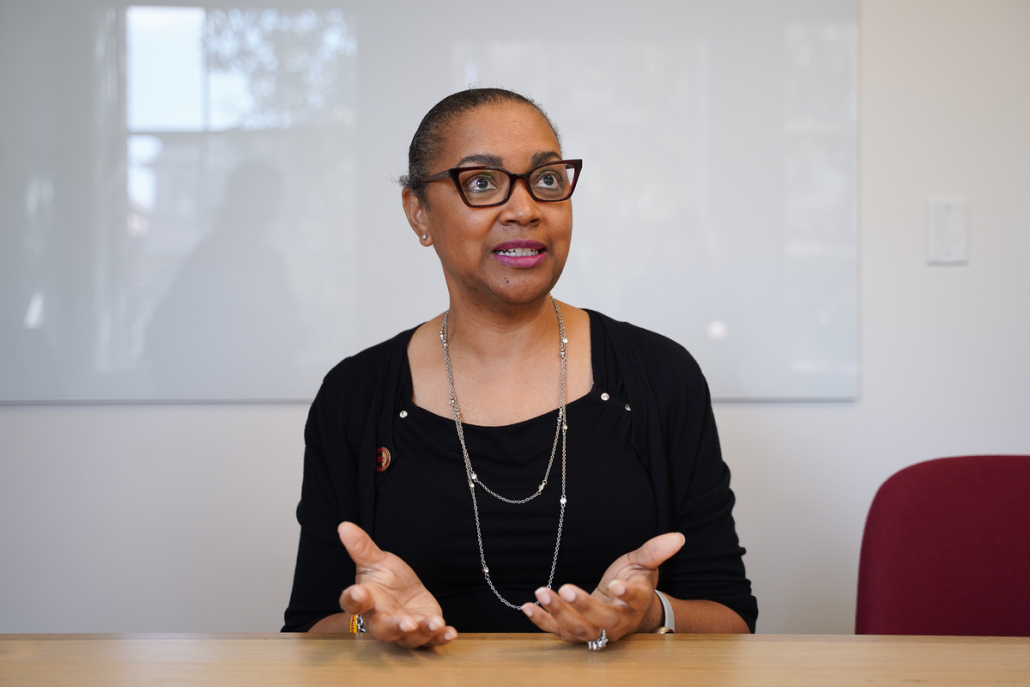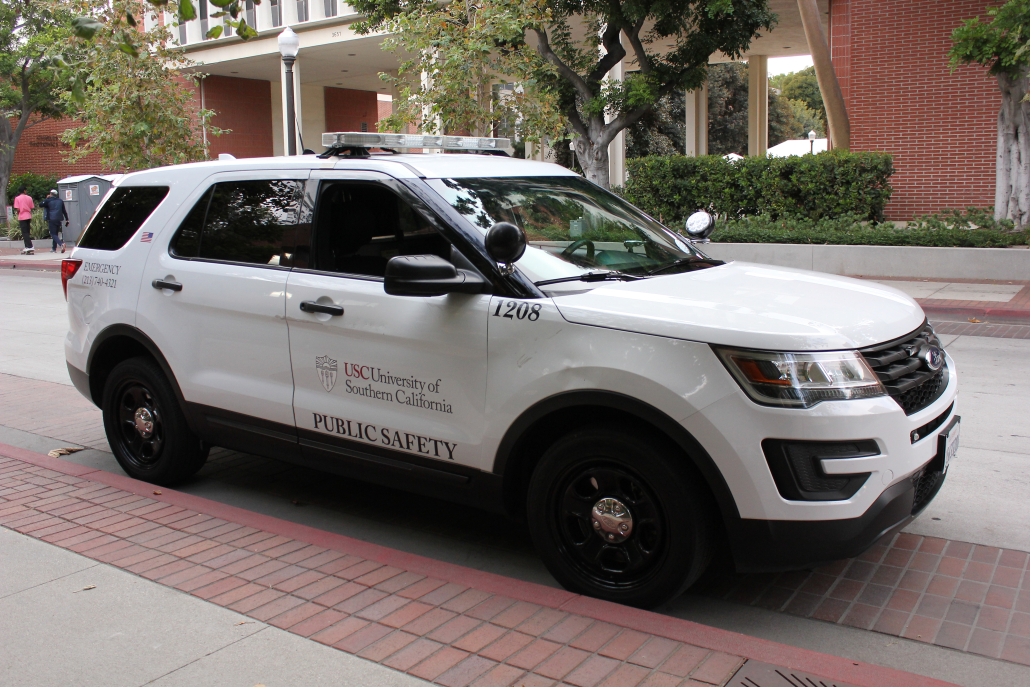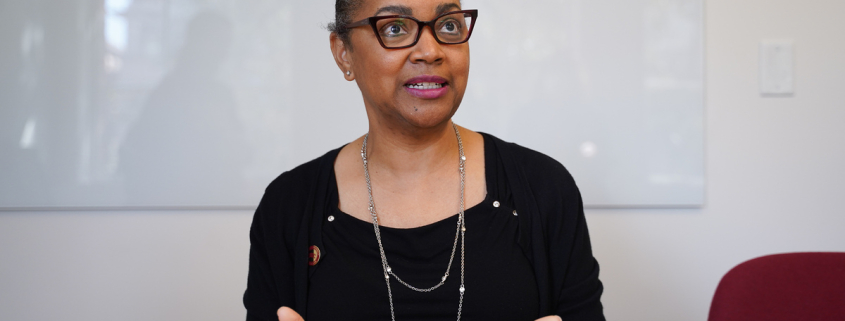New DPS leader talks prioritizing transparency, community relationships

Last week, the Department of Public Safety at USC welcomed its new leader, Assistant Vice President/Chief of Public Safety Lauretta Hill, who assumed her position Feb. 6.
Associate Senior Vice President of Safety and Risk Assurance Erroll Southers announced Hill’s appointment Dec. 9 in a university-wide email, heralding her experience in public safety leadership roles on both the municipal and collegiate levels. Prior to joining USC, Hill was the deputy chief for the Miami Beach Police Department, the Arlington Police Department assistant chief and the chief of police at the Dallas College Police Department.
Assistant Chief David Carlisle occupied the DPS leadership position since January 2022 following the retirement of former Chief John Thomas, who had served in the role since 2013. Thomas’ departure kickstarted a nationwide search effort for his replacement, a process that involved a 22-member committee of students, faculty, staff and community leaders, and the help of external search firm Spelman Johnson. The University narrowed the search down in April, but extended it in May and broadened the title to include the assistant VP role.
The Daily Trojan sat down with Hill Monday morning for her first student media interview at USC to discuss her decision to pursue the position, her vision for DPS and the actions she looks to take in her first few months on the job.
This interview has been edited for length and clarity.
Daily Trojan: What policies were you responsible for implementing and overseeing at Dallas College? How will your experience at Dallas College inform your leadership at USC?
Lauretta Hill: When I came in, I actually started the police department [at Dallas College]. There were seven separate police departments — each campus had their own —, so we had to rewrite the entire policy manual. So I had the opportunity to reset and [ask], “What do we want the policy to be? What was the best practice? What was the national standard?”
That experience and looking at policies, bringing it here is a carryover, is transitional, because I’m able — and it’s going to be expected of me — to look at all our policies and just to make sure that they’re in line with what’s best for USC, and then they’re also in line with the best practices in universities in campus law enforcement.
DT: What actions will you take in your first 90 days on the job? How do you see DPS evolving in your first year with the department?
LH: I’m still getting used to things and looking at things and seeing how things work. It’s taking me a little while to do that. My community policing philosophy closely aligns with the ONE USC Safety Vision. My priority is to look at the Community Advisory Board report and the recommendations — I know there’s obviously some that have already been implemented — to look at those and closely align my first 90 days with implementation of that vision.
DT: The subject of police violence and overstepping has been in the spotlight in 2023 — the LAPD killed six individuals since the start of the year, among them Keenan Anderson and Oscar Sanchez, who were both undergoing mental health crises near the time of their deaths.
Will DPS be undergoing any further reforms in critical incident response and mental wellness checks in light of these incidents? Does DPS have plans to continue or to expand the Mental Health Assistance and Response Team?
LH: The MHART team, that’s a national model. That interdisciplinary response team is what DPS and other departments around the country have been looking at as an alternative to armed response. It’s on the forefront because there’s not many departments that have it.
We’ll be evaluating that to ensure that officers are trained, how it’s working. It is absolutely imperative that officers understand the difference in that we’re dealing with people in mental health crisis and that we need those mental health responders to go with us.

DT: The presence of armed officers at USC has come into scrutiny in the past few years in the wake of widespread police violence in the United States, with community critics saying they feel more scared than safe because of it — especially those belonging to groups disproportionately targeted by police activity. Do you have plans to alter the presence of armed officers on campus, and how do you respond to these criticisms?
LH: Having officers that have all those resources and those tools — obviously, de-escalation, just a plain meeting with nothing happening is the best result. But if something is occurring, you want to have your officers here and close and not be waiting on the Los Angeles Police Department to respond.
You need to have all those tools available to you, from verbal — just talking, working through an incident — all the way up to potentially using a firearm and not waiting for somebody with a 15- to-20-minute response time when our students, faculty and staff need that. You want those tools to be available to us, to DPS.
DT: When your hiring was announced, Southers said he hopes you take DPS and USC security “to the next level.” What does that mean to you?
LH: To me, that means making sure that we’re integrated into USC and that everybody’s voices are heard, and that we build DPS based on the needs of people here and not what DPS wants, but based on the needs from the community that we serve.
DT: The CAB report found that 31.7% of 1,050 stops by campus officers in 2019-20 involved Black people, despite them only comprising 5.5% of the student body. Do you plan to publish statistics that track whether DPS has reduced disproportionate policing and racial profiling? What actions do you plan to take to address this issue, flagged back in 2021?
LH: Profiling is absolutely unconstitutional and I will not tolerate it, period. Transparency is key. As I look at how we publish data, how transparent we are, you will understand that I am very transparent. I think it’s important for people to know what we’re doing, how we’re doing it, so they can review and see for themselves. I plan on erring on the side of transparency.
DT: Do you have plans to require officers to log all officer-initiated stops? That was something that was found not to be required by DPS in the CAB report.
LH: I don’t know what the process is, but I definitely plan to look at all of the digging deeper and be able to answer that a little more in-depth.
DT: How do you see DPS’ role in interacting with the University Park community outside of USC’s gates? Will DPS work to ensure the surrounding area does not suffer from over-policing and patrolling, and that community members trust DPS officers?
LH: It is absolutely imperative that we are partners and collaborate with the entire community. All our students, faculty and staff live outside of the University, so it’s really important that we are part of the entire community internally and externally. I will absolutely build those relationships. I know there’s some that’s already there.
I want to be available. I want people around the community to know that DPS is here for them, not just on the campus, but the surrounding campuses that we’re going to serve them. It’s my goal to make sure that everybody feels that their voices are heard and that policing [and] DPS is measured on how we respond.
DT: Are there any specific community outreach programs or initiatives that you’re hoping to lead to make sure that there’s that kind of knowledge and trust in the community?
LH: There’s a lot of national models and a lot of things that are out there, but I don’t know everything that we have here, so I want to evaluate what we have here, and then add to it.
DT: What drove your decision to apply to work at USC’s DPS?
LH: This is kind of a once-in-a-lifetime opportunity. These positions at universities, such as USC, don’t come up that often and, so, when they do, you just look at it as, “Okay, can I do something to further the department? Can I bring something that will help them move the needle to the next level?” I felt that I had some more time in me in my career. I wasn’t ready to go home.

